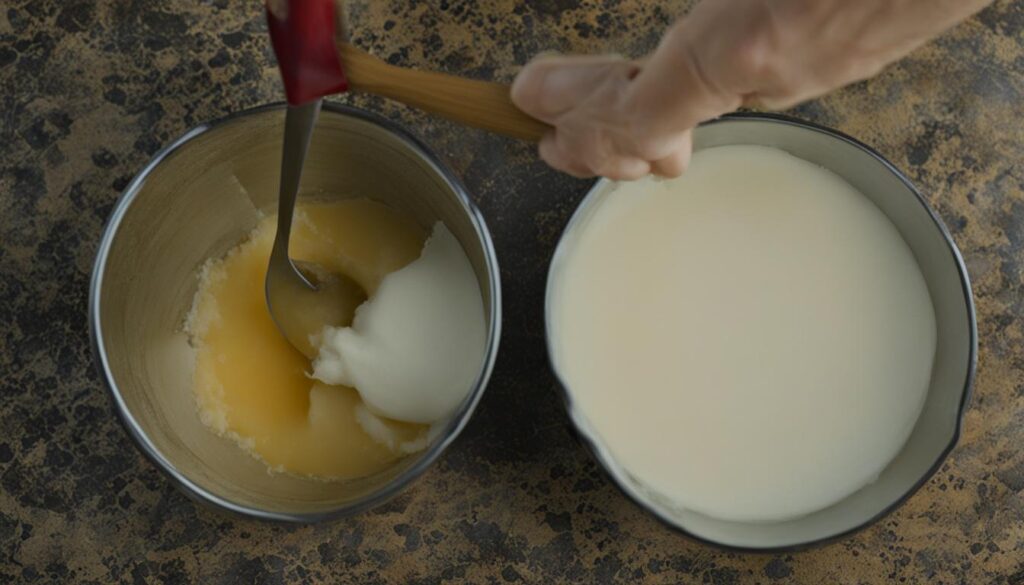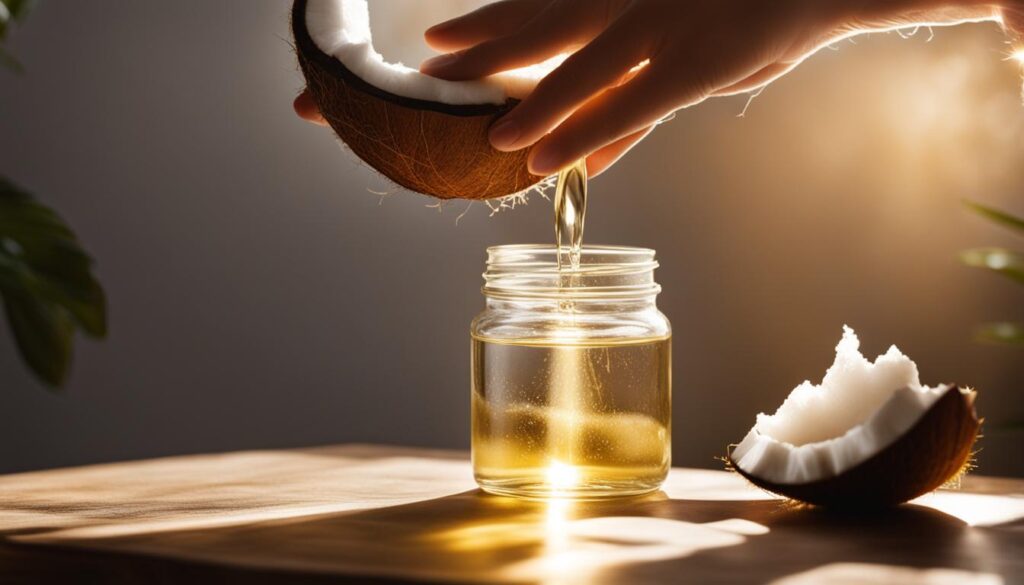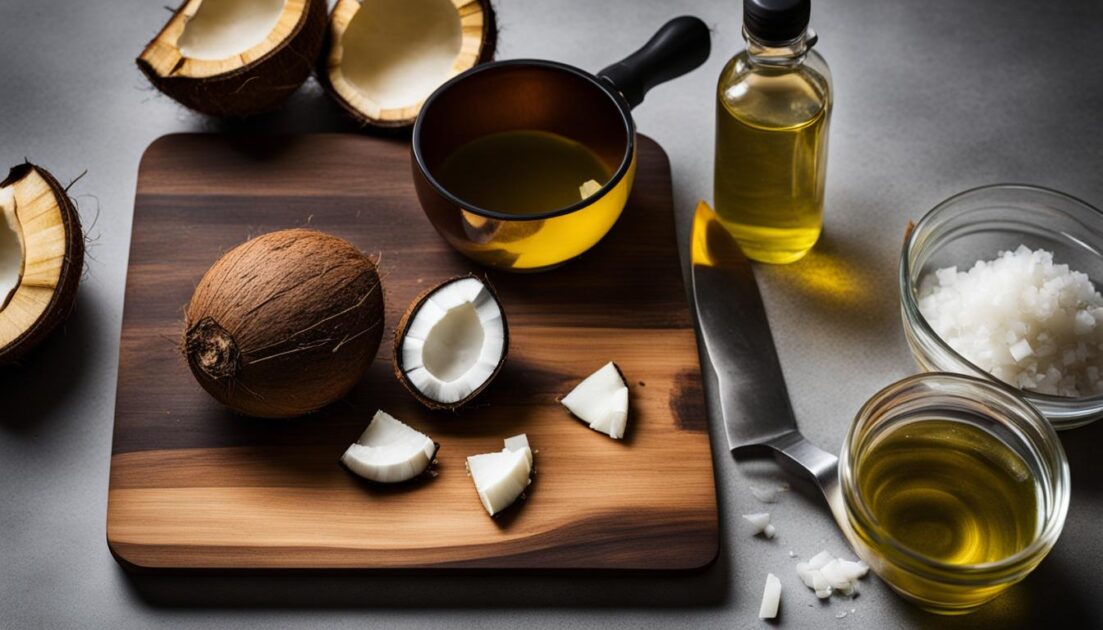Making your own coconut oil at home is a simple and rewarding process. Not only can you enjoy the delicious flavor of homemade coconut oil in your cooking, but you also have the satisfaction of knowing that it is pure and free from any additives or chemicals. In this guide, I will walk you through the easy steps of extracting coconut oil from fresh coconuts and share some valuable tips along the way.
Key Takeaways:
- Learn how to make coconut oil at home using fresh coconuts.
- Discover the numerous benefits of homemade coconut oil.
- Explore different uses for homemade coconut oil in cooking, beauty, and health.
- Understand the importance of quality and storage when making coconut oil at home.
- Experience the satisfaction of creating a useful product from scratch.
Why Make Coconut Oil at Home?
Making coconut oil at home allows you to have control over the quality and purity of the oil. Commercially available coconut oils may undergo refining processes that can affect their nutrient content. By making coconut oil at home, you can ensure that you are getting virgin coconut oil, organic coconut oil, and cold-pressed coconut oil. Additionally, homemade coconut oil can be used in various ways, such as for cooking, beauty treatments, and health remedies.
When you make coconut oil at home, you have the assurance that it is not processed with any chemicals or additives. This means you can enjoy the natural flavor and aroma of the coconut in your cooking and skin care routine. Homemade coconut oil retains more of the natural nutrients found in coconuts, making it a healthier choice compared to commercially available options.
One of the key advantages of homemade coconut oil is its versatility. It can be used in various ways, making it a valuable ingredient to have in your pantry. You can use it to sauté vegetables, bake delicious treats, or add a tropical flavor to your smoothies. In terms of beauty treatments, it can be used as a moisturizer, hair mask, or natural makeup remover. Additionally, the health benefits of coconut oil range from supporting heart health to aiding digestion and boosting the immune system.
Instead of relying on store-bought coconut oil, making it at home allows you to customize it to your preferences. You can experiment with different coconut varieties, extraction methods, and even mix in other natural ingredients to enhance its properties. This level of personalization can elevate your cooking and beauty routines while also providing the satisfaction of creating something from scratch.
So, whether you’re looking to enjoy the benefits of virgin coconut oil, ensure the purity of organic coconut oil, or indulge in the richness of cold-pressed coconut oil, making coconut oil at home is a rewarding and practical choice.
| Benefits of Making Coconut Oil at Home | Commercially Available Coconut Oil |
|---|---|
| Control over quality and purity | Potential refining processes |
| Retains natural nutrients | Possible loss of nutrients during processing |
| Versatile uses in cooking and beauty | Limited application possibilities |
| Customizable to personal preferences | No control over extraction methods or ingredients |
| Satisfaction of creating something homemade | No involvement in the creation process |
Steps to Make Homemade Coconut Oil
The process of making homemade coconut oil involves several simple steps. By following these steps, you can extract coconut oil from fresh coconuts and enjoy the natural goodness of homemade oil.
- Open the coconuts: Begin by opening the coconuts and removing the coconut meat from the shells. This can be done using a knife or a coconut opener tool.
- Shred the coconut meat: Once the coconuts are open, shred the coconut meat using a food processor. This will help in extracting the oil from the coconut meat more effectively.
- Blend the shredded coconut meat with water: Place the shredded coconut meat in a blender and add water. Blend it well to create coconut milk.
- Strain the coconut milk: Pour the coconut milk into a fine-mesh strainer or cheesecloth to separate the coconut meat from the milk. This step is important for removing any solid particles from the milk.
- Warm the coconut milk: Transfer the strained coconut milk to a saucepan and warm it over low heat. Heating the milk will help the coconut oil to rise to the top.
- Separate the coconut oil: As the coconut milk cooks down, the coconut oil will start to solidify and separate from the milk. You can skim off the solidified oil from the top as it forms.
- Strain and store the coconut oil: Finally, strain the coconut oil through a fine-mesh strainer or cheesecloth to remove any impurities. Transfer the strained oil into an airtight container and store it in the refrigerator to maintain its freshness.

These simple steps will guide you through the process of making homemade coconut oil. You can now enjoy the benefits of pure, natural coconut oil in your cooking, beauty routines, and more!
Tips for Making the Best Coconut Oil
To ensure the best quality coconut oil, there are a few tips to keep in mind. Follow these recommendations to make the most out of your homemade coconut oil:
- Use fresh coconuts: Using fresh coconuts will yield the highest amount of oil and ensure a more flavorful result.
- Choose organic coconuts: Opt for organic coconuts to avoid any chemical residues that may affect the quality of your coconut oil.
- Keep the temperature low: When simmering the coconut milk, it’s important to keep the temperature low to prevent overheating and preserve the natural nutrients and flavor of the oil.
- Strain carefully: After extracting the coconut oil, make sure to strain it carefully to remove any impurities. This will result in a smoother and cleaner final product.
- Store in a sealed glass container: To maintain the freshness and quality of your homemade coconut oil, store it in a sealed glass container in the refrigerator. This will help preserve its flavor and extend its shelf life.
By following these tips, you can ensure that you are making the best quality coconut oil at home, with all its natural goodness intact.
Benefits of Homemade Coconut Oil
Homemade coconut oil offers numerous benefits for both health and beauty. Coconut oil is rich in healthy fats and antioxidants, which can support heart health and boost the immune system. It can also moisturize the skin, promote hair growth, and soothe various skin conditions. Incorporating homemade coconut oil into your daily routine can provide you with a natural and versatile product that offers a wide range of benefits.
When it comes to health benefits, coconut oil is known for its high content of medium-chain triglycerides (MCTs). These healthy fats are easily absorbed by the body and can provide a quick source of energy. MCTs have also been shown to improve brain function and support weight loss.
“Coconut oil contains a unique combination of fatty acids that can have positive effects on your health. It is especially rich in lauric acid, which has antimicrobial and antifungal properties.”
Furthermore, the antioxidants present in coconut oil can help reduce inflammation and protect the body against oxidative stress. This can potentially lower the risk of chronic diseases such as heart disease and certain types of cancer.
When it comes to beauty benefits, coconut oil is a popular natural ingredient in skincare and haircare products. Its moisturizing properties can nourish and hydrate the skin, leaving it soft and supple. Coconut oil can also be used as a natural makeup remover, effectively removing even stubborn waterproof makeup.
“Coconut oil is a versatile beauty ingredient that can be used as a natural moisturizer, makeup remover, and hair conditioner. It can help repair damaged hair, reduce frizz, and promote healthy hair growth.”
Additionally, coconut oil has been found to have antimicrobial properties, making it effective in combating various skin conditions like acne, eczema, and fungal infections.
Overall, incorporating homemade coconut oil into your daily routine can provide you with a multitude of benefits. From supporting your overall health to enhancing your beauty regimen, coconut oil is a natural and versatile product that can work wonders.

References:
- Nutrition and metabolism. (2015). Coconut oil consumption and cardiovascular risk factors in humans. https://www.ncbi.nlm.nih.gov/pmc/articles/PMC4486468/
- Rele, A. S., & Mohile, R. B. (2003). Effect of mineral oil, sunflower oil, and coconut oil on prevention of hair damage. Journal of cosmetic science, 54(2), 175–192.
- Evangelista, M. T., Abad-Casintahan, F., & Lopez-Villafuerte, L. (2014). The effect of topical virgin coconut oil on SCORAD index, transepidermal water loss, and skin capacitance in mild to moderate pediatric atopic dermatitis: a randomized, double-blind, clinical trial. International journal of dermatology, 53(1), 100–108.
Different Uses for Homemade Coconut Oil
Homemade coconut oil is a versatile ingredient that can be used in various ways, offering a wide range of benefits for cooking, beauty, and health. Below are some of the different uses for homemade coconut oil:
- Cooking with Coconut Oil: Coconut oil has a high smoke point, making it suitable for cooking, baking, and frying. Its natural flavor adds a delightful taste to dishes, and its beneficial fats make it a healthier alternative to other oils.
- Beauty Uses for Coconut Oil: Homemade coconut oil can serve as a base for creating natural beauty products. It can be used in homemade lotions, scrubs, and hair masks to moisturize the skin, exfoliate dead skin cells, and promote hair growth.
- Health Uses for Coconut Oil: Coconut oil is believed to have numerous health benefits. It can be used for oil pulling, a traditional oral hygiene practice that involves swishing oil in the mouth to remove bacteria and improve oral health. Additionally, coconut oil can be applied topically to soothe dry skin and provide relief for skin conditions like eczema and psoriasis.
Furthermore, coconut oil can be used as a natural sunscreen to protect the skin from harmful UV rays. It can also be used for oiling wooden furniture to prevent drying and cracking. With its versatile applications, homemade coconut oil is a valuable ingredient to have on hand for various needs.

“Coconut oil can be used in cooking, beauty treatments, and health remedies, making it a valuable ingredient to have on hand.”
Shelf Life and Storage of Homemade Coconut Oil
Homemade coconut oil has a shorter shelf life compared to commercially produced coconut oils. To ensure its freshness, store homemade coconut oil in a sealed glass container in the refrigerator.
Proper storage is crucial for preserving coconut oil and preventing it from going rancid. The cool temperature of the refrigerator slows down the oxidation process and helps maintain the oil’s quality.
When storing homemade coconut oil, it’s important to consider a few key points:
- Choose a glass container: Glass is non-reactive and provides an airtight seal, preventing any external factors from affecting the oil’s quality.
- Seal the container tightly: Ensure that the lid is tightly closed to prevent any air from entering and oxidizing the oil.
- Place it in the refrigerator: Store the container in the refrigerator, away from any direct sources of heat or light, as they can accelerate the oxidation process.
It’s also important to note that the consistency of homemade coconut oil can change when refrigerated. The cold temperature causes the oil to solidify, but it will return to its liquid form when brought to room temperature.
By following these storage guidelines, you can extend the shelf life of homemade coconut oil and ensure its freshness for longer periods.
Final Thoughts
Making coconut oil at home is a rewarding and fulfilling DIY project. Not only do I have control over the quality of the oil, but I also get to experience the satisfaction of creating a useful product from scratch.
Homemade coconut oil offers numerous benefits for both health and beauty. Its natural goodness can be enjoyed in various ways, from cooking to beauty treatments. By following the simple steps outlined in this guide, you can unlock the power of homemade coconut oil in your everyday life.
Homemade products have their unique charm, and coconut oil is no exception. The satisfaction that comes from knowing I made something myself is incomparable. Plus, I can feel confident about the quality of the coconut oil I use, as I personally control every step of the process.
So, why settle for store-bought when you can embark on this DIY adventure? Dive into the world of homemade coconut oil and indulge in the benefits it offers. From its versatile uses to the joy it brings, homemade coconut oil is a true gem that you can create in the comfort of your own home.
FAQ
How do you make homemade coconut oil?
Making homemade coconut oil involves opening fresh coconuts, removing the meat, shredding it, blending it with water to make coconut milk, heating the milk to separate the oil, and straining the oil for storage.
Why should I make coconut oil at home?
Making coconut oil at home ensures you have control over the quality and purity of the oil. It allows you to obtain virgin, organic, and cold-pressed oil, unlike commercially available options that may undergo refining processes.
What are the steps to make homemade coconut oil?
The steps to make homemade coconut oil include opening coconuts, removing the meat, shredding the meat, blending it with water to make coconut milk, heating the milk to separate the oil, and straining the oil for storage.
What are some tips for making the best coconut oil?
To make the best coconut oil, use fresh coconuts, choose organic ones, simmer the coconut milk lightly to prevent overheating, strain the oil carefully, and store it in a sealed glass container in the refrigerator.
What are the benefits of homemade coconut oil?
Homemade coconut oil is rich in healthy fats and antioxidants, supporting heart health and boosting the immune system. It can also moisturize the skin, promote hair growth, and soothe various skin conditions.
How can homemade coconut oil be used?
Homemade coconut oil can be used in cooking as a healthier alternative to other oils, as a base for homemade beauty products, for oil pulling, as a natural sunscreen, and for oiling wooden furniture.
How long does homemade coconut oil last, and how should it be stored?
Homemade coconut oil has a shorter shelf life compared to commercially produced ones. It should be stored in a sealed glass container in the refrigerator to preserve its freshness and quality.
What are some final thoughts about making homemade coconut oil?
Making coconut oil at home is a rewarding DIY project that allows you to experience the satisfaction of creating a useful product from scratch. It also offers numerous benefits for both health and beauty and can be used in a variety of ways.






